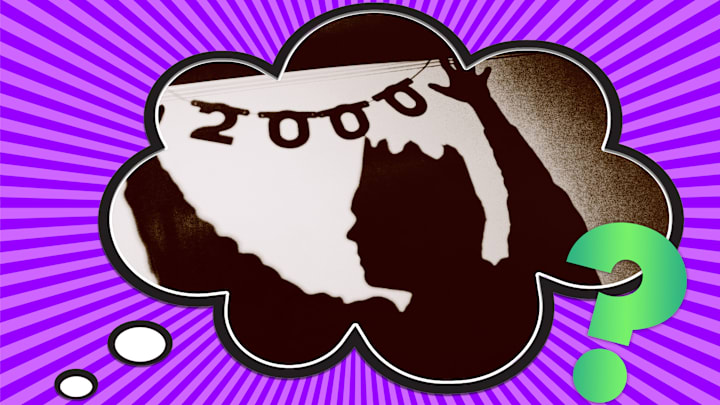Most decades are easy to name. It takes no thought at all to realize we’re in the ‘20s, and just about every other decade is equally easy: the ‘30s, ‘40s, ‘50s, ‘60s, ‘70s, ‘80s, ‘90s, and teens.
Then there’s the first decade of the 21st century. Why do we refer to that period of time, from 2000–2009, using the aughts?
The Meaning of Aught
The aughts was suggested because of those ‘00s: Aught (or ought) means “zero,” and it’s a corruption of the older word naught, which dates all the way back to Old English. (If you recognize it, it’s likely from the expression all for naught.)
According to the Oxford English Dictionary (OED), aught and ought emerged in the 1800s; the oldest known example appeared in Maria Edgeworth’s 1822 book Frank: A Sequel to Frank in Early Lessons: “It was said … that all Cambridge scholars call the cipher aught and all Oxford scholars call it nought.”
While we tend to refer to the beginning of the 20th century as the 1900s today, according to Slate, the aughts was one of “the most common” terms for that period of time in that era, which was apparently “a logical extension of the fact that Americans living at the turn of the century referred to individual years as ‘aughts,’ meaning zero, as in ‘nineteen aught one,’ ‘nineteen aught two,’ etc.”
Aughts vs. Noughties
Another term for the first decade of this century used primarily in the UK and Australia has been successful enough to make the OED: the Noughties (or Naughties).
The term has been in use since at least a 1989 William Safire column in The New York Times on the topic of what to call the first decade of the new millennium: “That postcard touches on several possibilities suggested by scores of … third-millennium freaks ... The Naughties was suggested by 40 readers.”
A 1991 New Scientist article also used the term, with a finger-wagging tone: “With regard to Richard Caie’s question about suitable names for the next two decades … : considering the moral decline of society as a whole, the next decade must surely be the noughties.”
By 1999, however, what to call the upcoming decade was far from settled, with the BBC noting that “No one seems to have been able to provide an answer to the puzzle of what the next decade will be called. … The ‘noughties’ could be the one to head the—admittedly sorry—list of contenders.”
But few say “Naughties” or “Noughties” today, probably because it feels like a schoolmarm dressing down a child, or, as the BBC put it, “a polite, middle-class code for the reproductive organs”—funny ways to talk about a decade, no matter how you look at them.
What’s in a Name?
Interestingly enough, even during the aughts, there wasn’t universal agreement on what to call them. As linguist and language columnist Ben Zimmer wrote at the Oxford University Press blog:
“It’s a curious situation: here we are at the end of 2007, and we still lack a commonly accepted term for the current decade. Very often English speakers deal with this quandary by employing the strategy of ‘no-naming’ (a term that sociolinguists use to describe the avoidance of address terms when one is unsure what to call one’s interlocutor). You can hear this kind of no-naming when a radio station announces that it plays ‘hits from the ’80s, ’90s … and today!’ But that’s hardly a satisfying solution. Surely we can do better in the next two years before the decade runs out?”
Zimmer ran down several suggested monikers for the decade, which included everything from the 2000s to names like the nillies, the deccies, the double zeroes, the oh-ohs, and the pre-teens.
But none of those terms made the jump into common usage. For whatever reason, it seems like the aughts—archaic or not—gets the job done. Though, as staff writer Rebecca Mead wrote at The New Yorker in 2009, it wasn’t a perfect solution:
“[T]he adoption of ‘the aughts’ as the decade’s name only accelerates the almost complete obsolescence of the actual English word ‘aught,’ a concise and poetic near-synonym for ‘anything’ that has for centuries well served writers, including Shakespeare ... To call the decade ‘the aughts’ is a compromise that pleases no one, and that has more than a whiff of resigned settling about it.”
Discover the Answers to More Big Questions:
